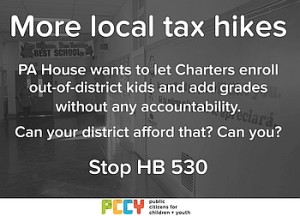A bill you can’t afford
Supporters of charters heard some bad news last week. So, too, did supporters of district-run schools.
It’s no coincidence that it’s the same bad news–the sudden introduction of House Bill 530 into the state’s budget conversation.
It’s a bad bill replete with bad ideas. Here are just three:
1. Allows charters to retain huge budget surpluses
Well-run charters should be offended by the bill that would allow any charters to sit on a bloated 16% fund balance, or surplus. That’s twice as much as school districts are allowed and implies low competence in fiscal management.
For some, the proliferation of charters is a positive trend because of a belief that smaller (than school district) organizations can more efficiently marshal tax dollars and deliver superior results.
Reports show that in Pennsylvania the latter tends not to be true. And, as this bill will permit hoarding of funds via an inexplicably large fund balance, our legislators seem all too comfortable that the belief of charter efficiency just doesn’t add up.
Across PA, that means a total of $238M in tax dollars is languishing in the accounts of charter schools instead of being spent on their kids. Everyone can agree that after forcing most districts in the state to raise local taxes due to the lack of education dollars, the bill’s lack of oversight consideration is alarming to say the least.
2. Puts the public on the hook for private borrowing
Thanks to HB 530, the debts of organizations that run charters could suddenly become the debts of taxpayers.
Take the case of Philly’s Delaware Valley Charter High School, currently on the brink of financial collapse with mounting debts, including $440,000 for overbilling the district and $216,000 in payments to the state teachers’ pension fund.
HB 530 puts the Commonwealth on the hook when charters are unable to make debt payments, regardless of whether those charters are grossly underperforming or failing to educate our students. How does that increase accountability or promote financial discipline?
3.Fosters poor performance
HB 530 creates a brand new and unanticipated cost that will further burden school districts already hobbled by what the PA auditor general called “the worst charter school law in the U.S.”
The bill would allow students to enroll in out-of-district charters, which would heap unbudgeted costs upon districts (again, we’re talking about nonprofit groups spending tax dollars here) with no way of controlling them.
The uncontrolled expansion of charter enrollment doesn’t end there. In addition to an influx of out-of-district students, charters would be allowed to offer new grades without review or negotiation—regardless of performance.
That’s right–HB 530 establishes a state system to measure charter school performance but forbids those evaluations from being used when considering charter applications, renewal or termination.
All was silent in Harrisburg this week as legislators failed to come up with a way to pay for budget priorities. But if HB 530 is any indication, they may not be trying hard enough or paying close enough attention. If the bill was supposed to be the long overdue overhaul of charter school law, it fails to serve the interests of taxpayers, creates wholly new problems in an already plagued and derided charter system, and by neglecting charter school performance, it certainly fails kids.
 Can you imagine a school with no art? Kids at schools who are awarded arts grants from PCCY don’t have to. Find out how you can support the Picasso Project by donating $25, $50 or more to bring the arts to classrooms. DONATE HERE–It’s quick and secure!
Can you imagine a school with no art? Kids at schools who are awarded arts grants from PCCY don’t have to. Find out how you can support the Picasso Project by donating $25, $50 or more to bring the arts to classrooms. DONATE HERE–It’s quick and secure!
 Calling child care providers: Need help securing new Philly pre-k seats and building quality in your center/group/family-based child care? Come out to our prep session! LEARN MORE
Calling child care providers: Need help securing new Philly pre-k seats and building quality in your center/group/family-based child care? Come out to our prep session! LEARN MORE
![]() Moody’s says PA’s sinking credit rating “reflects the likelihood that the Commonwealth’s credit challenges are likely to worsen in the near term absent political compromise.” READ IT HERE
Moody’s says PA’s sinking credit rating “reflects the likelihood that the Commonwealth’s credit challenges are likely to worsen in the near term absent political compromise.” READ IT HERE
![]() On pre-k: “The case for more funding is potent. We risk falling behind as a nation. Moreover, the group cited a study showing Pennsylvania already is falling behind neighboring states, serving only 26 percent of 4-year-olds eligible for pre-k. West Virginia, by comparison, serves 94 percent.” Wilkes-Barre Times Leader, Editorial.
On pre-k: “The case for more funding is potent. We risk falling behind as a nation. Moreover, the group cited a study showing Pennsylvania already is falling behind neighboring states, serving only 26 percent of 4-year-olds eligible for pre-k. West Virginia, by comparison, serves 94 percent.” Wilkes-Barre Times Leader, Editorial.

